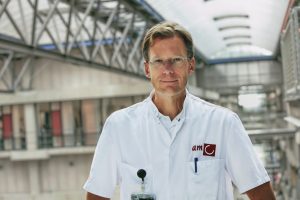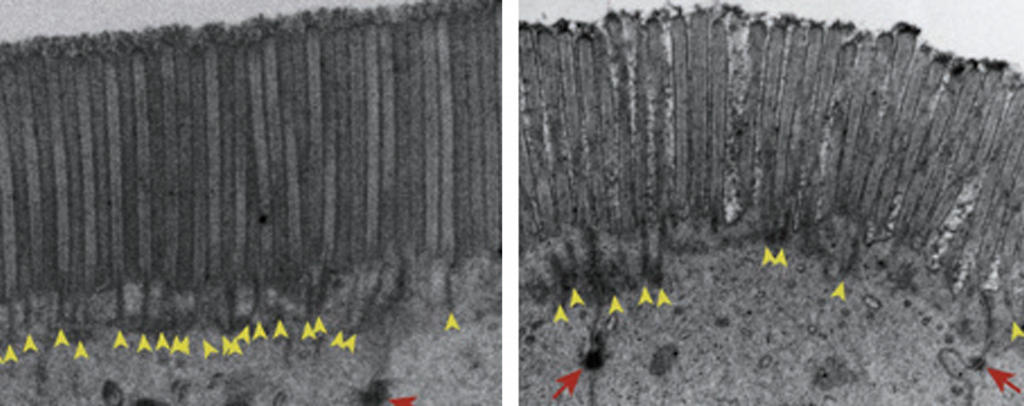“We are trying to reduce the burden of digestive diseases.”
 Prof. Paul Fockens (Amsterdam University Medical Center, the Netherlands) is Professor and Chair of Gastroenterology, Hepatology and Gastrointestinal Endoscopy and current President of the United European Gastroenterology.
Prof. Paul Fockens (Amsterdam University Medical Center, the Netherlands) is Professor and Chair of Gastroenterology, Hepatology and Gastrointestinal Endoscopy and current President of the United European Gastroenterology.How did you find this year’s UEG Week?
I think the conference was a big success again, maybe even better than in previous years. What typically goes very well at this conference is the multidisciplinary nature; we have a number of other societies that participate, so there is not a single session which is not characterised by multi-disciplinary aspects. We met our goal of having over 13,000 participants, which was a very nice turnout, and we had a fantastic multidisciplinary post-graduate course programme as well. Over 4,000 people participated in the Saturday and Sunday courses held before the actual meeting, which represents a tremendous growth in attendance observed over the last few years.
The UEG covers more than just the annual conference, can you discuss the vision of the UEG?
The idea is to improve the knowledge of gastroenterology throughout medicine. We try to increase the knowledge, if you look at the more political part of it, the public affairs part of it, we try to reduce the burden of digestive diseases and improve digestive health, so we also look at prevention. The UEG Week is the biggest event we hold, obviously it is a very important event for us, but we also use a lot of UEG resources to invest in research, in public affairs, in education, and all the other things we do.
Given that resources are limited, what are the UEG priorities?
What the UEG tries to do is raise the level of GI knowledge to support integration of subspecialties, taking it to a level of collaboration, instead of individual silos. Gastroenterology, in particular, has a lot of silos, such as liver disease, endoscopy, etc; there are 17 sub-specialty societies that participate in the UEG. The danger with silos is that they each may think that their area is the most important one. And of course, while we recognise that each subspecialty is individually important, overall, if we want to make an impact for patients in general with GI problems, then we should not look at the small sub-parts, but we should look at the whole of the United European Gastroenterology.
How would you compare the UEG to other global counterparts?
In general, UEG focusses on interdisciplinary work only, whereas the North American Digestive Disease Week serves individual programmes in each subspecialty. The UEG Week only advances research across subspecialties. Although each smaller specialty has its own programme, the UEG specialises in transcending specialist information and integrating the themes that run across specialties.
Globally, all of our colleague organisations need to focus more on education and prevention. One topic, for example, that has been under-researched in the last 20-30 years is nutrition. Happily, we are now experiencing a trend shifting focus towards nutrition again.
And then there are topics of a more specialist and experimental nature, such as trends in topics like microbiomics, in addition to all the -omics in the last years. While I think it is a nice area for research, the question remains how we can implement these developments into routine clinical practice. Although I am not sceptical, I do pragmatically believe that it will take 10 years for this research to adequately develop to reach clinical practice.
Take-home messages:
Go to the web site and look at the huge amount of educational material and opportunities there are outside the UEG Week meeting, including research opportunities. Not everyone can attend the UEG Week meeting, but the main events and news can be easily found on our webpage. The UEG aims to cover the scope of all specialties in the gastroenterology field and provide a framework for inter-specialty collaboration.
Posted on
Previous Article
« IL-17A blocker effective in paediatric psoriasis patients Next Article
Letter from the Editor »
« IL-17A blocker effective in paediatric psoriasis patients Next Article
Letter from the Editor »
Table of Contents: UEGW 2019
Featured articles
Interview with UEG President Prof. Paul Fockens
Upper GI Disorders
Locally active corticosteroid promising in eosinophilic oesophagitis
First-in-human radiofrequency vapor ablation in Barrett’s oesophagus
Irritable Bowel Syndrome
Faecal microbiota transplantation is effective for irritable bowel syndrome
Human milk oligosaccharides improve IBS symptoms
Inflammatory Bowel Disease
Ustekinumab is safe and effective in ulcerative colitis: 2-year data
Decreased microvilli length in CD patients
Phase 2 data shows benefit for mirikizumab in CD patients
Subcutaneous ustekinumab as maintenance therapy in UC
First evidence of long-term efficacy of ABX464 in ulcerative colitis
New treatment may reverse coeliac disease
IBD prevalence 3 times higher than estimated and expected to rise
Microbiome and Microbiota
Early stages of gastric metaplasia: molecular profiling
Plant-based foods and Mediterranean diet associated with healthy gut microbiome
Antibiotic resistance in H. pylori has doubled over last 20 years
Pancreatitis
New model predicts recurrence of acute biliary pancreatitis
Hepatology
Restrictive strategy for cholecystectomy selection does not reduce pain, but does reduce surgery
β-blockers may halt cirrhosis progression: PREDESCI trial
Obeticholic acid prevents liver fibrosis from NASH
Oncology
Metal stents are better than plastic for endoscopic biliary drainage
Ramosetron relieves low anterior resection syndrome
Immunonutrition during neoadjuvant oesophagogastric cancer therapy: no benefit
Endoscopy
EUS-guided histological specimens from the pancreatic cyst wall
Digital single-operator cholangioscopy more sensitive than endoscopic retrograde cholangiopancreatography
New single-use duodenoscope well-liked by endoscopists
Related Articles
October 23, 2019
Locally active corticosteroid promising in eosinophilic oesophagitis
October 23, 2019
Global burden of digestive diseases reveals alarming trends

October 23, 2019
Decreased microvilli length in CD patients
© 2024 Medicom Medical Publishers. All rights reserved. Terms and Conditions | Privacy Policy
HEAD OFFICE
Laarderhoogtweg 25
1101 EB Amsterdam
The Netherlands
T: +31 85 4012 560
E: publishers@medicom-publishers.com

